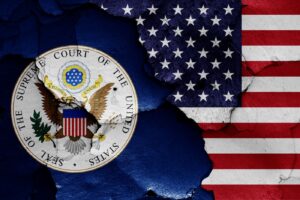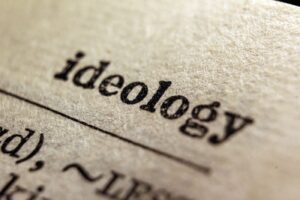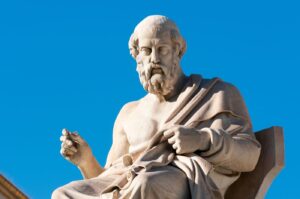Our current educational debates about critical race theory reveal how we have lost sight of teaching as a vocation. As a Hispanic woman with a Ph.D. in sociology who has been a professor in higher education for nearly fifteen years, I research and teach on questions regarding the weakest in society—immigrants, descendants of slaves, abused women, addicts, and the mentally ill. I sympathize with the desire to find solutions to human misery. But we must remember that these are complex problems that cannot be easily solved. Too many classrooms promote shallow groupthink and Orwellian Newspeak. Ideologies abound because soundbites promise simple explanations.
Educators should not avoid the complexities and conflicts in history, but they also need to teach students about the universal principles that unite us and sustain the hope needed for social harmony. The proper end of education, by which all other secondary ends are judged, is the moral formation of the person.
Teaching the young to encounter mystery, enjoy beauty, and worship God was once thought of as a public good. Today, too many young people experience an education based on rejecting universal parts of human nature, with grave consequences. The wrong educational system can deform character all too easily.
In my classes on educational philosophy, I discuss with students how John Dewey’s scientistic vision of democratic education has collapsed into technocratic programs based on a sweeping division of all of history into a battle between oppressed and oppressors. Dewey’s rejection of education as moral formation, including the need for contemplation and beauty, paved the ground for today’s woke education, much of which takes inspiration from Paulo Freire’s 1968 Pedagogy of the Oppressed.
Today, too many young people experience an education based on rejecting universal parts of human nature, with grave consequences. The wrong educational system can deform character all too easily.
Start your day with Public Discourse
Sign up and get our daily essays sent straight to your inbox.These attempts at social improvement through education may be well-intentioned. But because they neglect moral responsibility and ignore human freedom to choose right and wrong, they have ended up dividing us against each other, not uniting us in pursuit of justice. On the contrary, too much “educational reform” has produced hopelessness about society’s being locked in never-ending struggles between the oppressed and oppressors. Confronted with this sense that their actions cannot change the power structures of our society, combined with the idea that meaning and values are purely subjective, many young people fall into despair.
Students today are not lacking in opportunities to talk about social injustices, but they are often left wondering: how can education help unite us socially and politically? As I show in my recent book The Love of Learning: Seven Dialogues on the Liberal Arts and explain in video dialogues based on the book, many of our contemporary problems in education stem from the influence of Dewey, who overlooked the deeply contemplative aspects of education. In order for education to unite us rather than divide us, we must reunite beauty, truth, and goodness in education.
The Influence of John Dewey
As our nation went through massive scientific and technological changes at the end of the 1800s, Dewey, the influential American pragmatist philosopher, had a laudable vision to extend public education to the masses in the hope of supporting our democracy in its recovery from the Civil War. Dewey is mostly known for his works on education, including My Pedagogic Creed and Democracy and Education, in which he promotes experiential methods of education that seek to make knowledge relevant to students and to transform schools into sites of social reform.
Although aspects of Dewey’s methods were helpful reforms, his educational project was part of his much bigger objective to ground our common life on faith in democracy and science rather than faith in religious creeds and cults. As he wrote in A Common Faith, “New methods of inquiry and reflection have become for the educated man today the final arbiter of all questions of fact, existence, and intellectual assent. Nothing less than a revolution in the ‘seat of intellectual authority’ has taken place.”
The new method is the scientific method, in which the authority of science replaces the authority of religious tradition. For Dewey, the classroom is like a giant laboratory. Teachers do not pass on knowledge, but rather habituate students through experiential education to tinker, experiment, observe, and then reflect on the world.
Although values certainly influence human behavior, and religious values are important human motivators, Dewey objects to the idea that religious ideas have an authority that depends on some being whose existence is outside of nature. What matters for Dewey is not what religious believers claim—that their faith is in a reality that has an unseen but real existence—but the fact that human beings attribute truth to those religious beliefs, and therefore act upon them in the world in ways that promote justice and democracy.
For Dewey, the classroom is like a giant laboratory. Teachers do not pass on knowledge, but rather habituate students through experiential education to tinker, experiment, observe, and then reflect on the world.
For Dewey’s vision of democracy to emerge, we need to move past believing in supernatural truth, which is what he calls “encumbrances” to the true importance of religion—the values they provide for our life in common. As he wrote, “just because the release of these values is so important, their identification with the creeds and cults of religions must be dissolved.” For Dewey, schools are not institutions that preserve tradition or shape virtue. Rather, schools are sites of social reform, where students come to see how they contribute to the whole. As he wrote in My Pedagogic Creed,
I believe that it is the business of everyone interested in education to insist upon the school as the primary and most effective interest of social progress and reform in order that society may be awakened to realize what the school stands for, and aroused to the necessity of endowing the educator with sufficient equipment properly to perform his task.
Today, often from people who do not know the origin of this way of thinking, I have heard countless versions of Dewey’s arguments: religious values are good insofar as they inspire people to pursue democratic ideals. But our common faith is in our democracy, not in something supernatural. So many people repeat the idea we can promote the social good while rejecting the idea of a universal, objective truth. But not only does Dewey reject religious truth, it’s not clear that any values—even those undergirding democracy—are objectively true. Dewey starts with an a priori philosophical commitment: only science can ever lead to truth.
The Power of Beauty
Because Dewey’s underlying philosophy is scientistic, most students I’ve taught have never encountered the classical idea that beauty also leads us to truth about our common values and faith in supernatural realities. But humans have a commonsense perception that the world is ordered and that we can use our reason to discern universal principles of right and wrong.
The Italian philosopher Augusto Del Noce feared that reducing the symbolic dimension of reality to the subjective realm and enshrining only science as true quickly leads to social fragmentation and a greater separation between elites and the masses. As he explains in his book The Crisis of Modernity, every argument about values in European politics, once rendered subjective, becomes seen as “merely ideology” and “an instrument of power.” Likewise, beauty and culture become just more tools for domination or manipulation.
Similarly, writing in 1943 for an American audience in his book Education at the Crossroads, the French Catholic philosopher Jacques Maritain warned that the downstream impact of John Dewey’s philosophy of education, which negates contemplative truth, is a culture that will end in “a stony positivist or technocratic denial of the objective value of any spiritual need.” The idea that the human being has a cosmic origin and final end of union with the supernatural—Maritain’s view—stands in stark contrast to Dewey’s view that the human person is fundamentally a “maker” of things. For Dewey, our values lack objective truth and are merely tools to other ends. Seen as merely tools, our values can therefore be exchanged for other values that “work” better to achieve one or another end.
Given Dewey’s influence on American education, should we be surprised that today so many students today lack meaning, purpose, and hope? Our technological society provides endless sources of entertainment that are like junk food: images and soundbites momentarily satisfy a craving to experience something, but then leave people with a deeper need for true nourishment for the soul.
Many educators believe that their job is only to teach professional skills and leave students to choose for themselves what is right and what is wrong. Much of our schooling stops at teaching us how to manipulate the world. Most educators, administrators, and policymakers have lost sight of the power of beauty to draw students into contemplation of beauty and truth in ways that give them meaning, purpose, and hope. But this kind of value-free education leaves students bereft of meaning and purpose.
In my dialogue with him in The Love of Learning, Carlo Lancellotti, a mathematical physicist and translator of Augusto Del Noce, says, “We think that once we have analyzed things, that’s all there is, that the idea is exhausted by our analysis. . . . Experience is replaced by our abstract explanations of experience. What is really missing for so many today is the perception of beauty, and beauty as an opening to the mystery of God.”
Our technological society provides endless sources of entertainment that are like junk food: images and soundbites momentarily satisfy a craving to experience something, but then leave people with a deeper need for true nourishment for the soul.
An Alternative to Scientism
In his book The Risk of Education, the Italian Catholic priest and educator Luigi Giussani shows how many forms of contemporary education fail to produce a well-rounded human person—without which, Giussani warned, social or political good cannot come about.
Giussani begins by insisting that the human person contains a mystery that is the root of our subjectivity, our individuality. Only a recognition of our irreducible individuality can give rise to authentic solidarity and fraternity. As he wrote, “If we consider our nature to be the image of the mystery that made us, to be participation in this mystery, and if we understand that this mystery is mercy and compassion, then we will try to practice mercy, compassion, and fraternity as our very nature whatever the effort involved.”
Instead of guiding students to embrace mystery, much of contemporary education leads students to skepticism about their very being, worth, and dignity. This is wrong. Promoting skepticism about our ultimate ends as human persons is “absolutely not a rite of passage,” Giussani insists. “Skepticism . . . robs [students] of completely of any capacity for passion, and they become like people walking on sand, their energy and efforts sapped by the unstable terrain.” Should we be surprised at the psychological instability among students who have never been taught about their intrinsic worth?
Instead of guiding students to embrace mystery, much of contemporary education leads students to skepticism about their very being, worth, and dignity.
My students find Giussani’s call to return to tradition and authority in education to be inspiring. Giussani warned that skepticism about supernatural truth would lead to bigotry and fanaticism, or else a kind of anomie characterized by a lack of attachment to any ideals. As he writes, “in order to truly build a new society, it is necessary, first of all, to take the old one seriously, to take one’s tradition seriously.” He further explains that “without permanence, newness cannot exist.” That is because
loyalty to the given, to the tradition from which the young person’s mind originates, is the backbone of every responsible education. First of all, it lays the foundation for a sense of dependence, without which we violate and manipulate reality through presumptuousness, alter it through fantasy, or empty it through delusion. Second, it accustoms us to facing reality with the certainty that a solution exists. Without this, our very capacity to discover and energy to create relationships with things wither away.”
For the students I teach, as well as for the students Giussani taught, the idea that our scientific knowledge can create any reality we want, with no limit, rings hollow. Science alone can never determine moral right or wrong.
There Are No Quick Fixes—But There Is Hope
Recent debates about critical race theory have shown that trying to solve social problems while neglecting universally recognized virtues acquired through self-mastery—virtues like hope and love—not only fails to build democracy, it immiserates people. Students are facing depression and anxiety at unprecedented rates.
Integral human formation must recover education in beauty as the seed to sow the fertile ground to cultivate the fruits of intellectual virtue, restore the love of learning, and bring joy and trust into friendships, all the while retaining the personal discipline required to master and prudently use knowledge.
Students who have taken my classes find the educational philosophy and method of Jacques Maritain and Luigi Giussani to present a more hopeful view of education, because both of them acknowledge the moral conscience of the person. I work with a growing movement of teachers who have embraced a classical liberal arts approach to education as formation, grounded in the love of truth and search for wisdom. They are working in cities and rural areas, low-income and high-income areas, and with people of every skin color. They know that teaching is a vocation, not indoctrination.
The way to the truth is through beauty, which provides a unity of knowledge and a unity of hearts. The truth is more attractive than cancel culture can ever be. In order to reunite as a society, we have to choose mystery over ideology.










